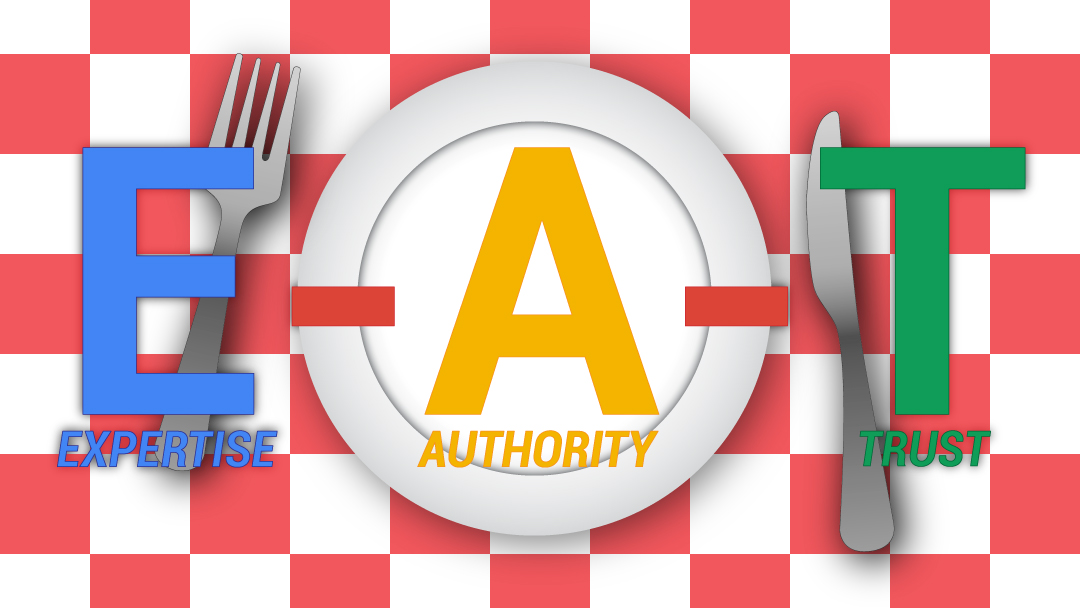Everyone has to eat. And would you believe that making sure your website eats is also important?
Figuring out the way to boost traffic to your website is a key step in planning success for your business. Search Engine Optimization (SEO) is a big factor in gaining traffic and attention. Google has many ways of evaluating content to rank it on their search results page and E-A-T is a guideline in their ranking system.
According to Google’s Search Quality Evaluator, a characteristic of high quality pages is if it has a high level of Expertise, Authoritativeness, and Trustworthiness, otherwise known as E-A-T. As an example, Google says that, “High E-A-T advice pages on topics such as home remodeling (which can cost thousands of dollars and impact your living situation) or advice on parenting issues (which can impact the future happiness of a family) should also come from “expert” or experienced sources that users can trust.”

What is Google E-A-T?
E-A-T (Expertise, Authoritativeness, and Trustworthiness) is an acronym that is often used by Google to judge the quality of a page and its content.
E-A-T isn’t an update nor an algorithm and there isn’t an internal score system. It is more of a principle. And depending on who you talk to, some people believe that E-A-T is important to sites and their ranking factor. E-A-T is a form of guidelines that help Google determine if the content is of value to the readers.
Google wouldn’t want to boost a link on their search page that contains information that isn’t full of facts, doesn’t come from a trustful source, and lacks authority. So let’s look at what exactly E-A-T stands for.
Expertise of the content’s creator.
Authoritativeness of the content, creator, and website.
Trustworthiness of the content, creator, and website.
Think of it like this: Google E-A-T is all about the quality of you and your content and your ability to answer the reader’s question without further investigation.

Is E-A-T a ranking system?
The short answer: Not entirely. But is it still important? Absolutely.
According to a 2019 interview with Gary Illyes from Google, there isn’t an internal score for EAT. Illyes further went on to say that several of the different algorithms that help judge ranking do use the concept of E-A-T.
E-A-T has a more indirect way of helping rank factors as it helps determine a website’s value. While E-A-T isn’t a ranking factor by itself, it can impact your rank. Covering these three pillars in your content is helpful because the value of your website is often taken into consideration when raters decide to share or recommend your site.
Consider E-A-T as to why people should choose your website over your competition. E-A-T could have a direct impact on how Google perceives and indexes your website. So while it isn’t an individual ranking system, it can and sometimes does indirectly contribute to your rank.
Google wants to ride the internet of misconceptions and false information on its platform. It wouldn’t be a shock if E-A-T becomes more important in future updates.

Then what’s the point of E-A-T?
E-A-T can help you grow your brand and build a positive and helpful presence online.
When it comes to E-A-T and your website, you have to understand that people are coming to you for information. There has to be some way of organizing the information so that the most accurate and most helpful information is easily accessible.
Say you were wanting to look up the safe amount of aspirin a child can have or how to file your taxes. You wouldn’t want the answers to come from someone with no true knowledge of the subject.
Google refers to these subjects as Your Money or Your Life (YMYL) and are topics that revolve around a person’s safety, health, or financial stability. E-A-T is useful to understand and implement if your page contains topics that are considered YMYL. Other examples would include pages that discuss housing information, the purchase of goods/services, and emergency preparedness.
This isn’t to say that E-A-T only applies to YMYL websites. Expertise is valuable for all topics. Some topics, however, require a less formal expertise. It is all about looking at the content of the page and deciding what kind of expertise is required for the page. Pages with medical information should be posted by someone with medical expertise or accreditation while pages like a fashion blog can be written with “everyday expertise.”
Also keep in mind that E-A-T has everything to do with credibility! So regardless of Google and their weigh in of how important it is, you should want to only produce credible and helpful information to consumers and your potential customers.

How can I improve my website’s E-A-T value?
Controlling and strengthening your E-A-T is entirely in your hands. It is up to you to show your expertise and authority in your content and prove that you are a trustworthy source. Here are 6 things to do with your content to improve your E-A-T.
1. Include Outside Links to Higher Sources.
A great way to increase your authority and trustworthiness is citing all of your sources and including links to some of those sources. This not only shows who you got your information from, but it also shows the proof behind your content.
Including links can also help you appear as an expert as well. There are so many sources to include like professional studies and research to even official documents from companies or the government.
2. Update and Check Content Regularly.
As time goes on, information can change or developments occur. You want to make sure that your content stays up-to-date and doesn’t fall behind in providing accurate information. For example, if Google ever makes E-A-T its own separate algorithm in the future, it would be wise that I come back and edit my section.
Another part of your content that needs to be checked is the links in your articles. Sometimes other sites will take down their articles or content and it causes the link in your content to go to an error page. Make sure that you check these links often to see if the content is still there.
3. Check the Facts.
Much like when you wrote essays and papers in school, it is very important to check your facts. It isn’t helpful to have misinformation in your content and it can result in consumers losing trust in both you and your company. Correct facts can help you stand out and show that you are a reliable source.
To avoid misinformation, check your facts against other credible sources and make sure to cite them. Checking your facts is especially vital for YMYL topics but is even applied to other topics. Google doesn’t want to promote sites that are full of unverified facts and weak sources.
4. Create Unique Content.
With so many different websites out there, it is smart to find a unique aspect to bring to your content. Find a way to stand out from the other sites that produce similar content to yours. Share the insight and experience that you have personally acquired.
Make sure that your content fits your audience and that it talks about your brand and its purpose. This type of information should be unique to your brand and if your content reflects that, you might have a better chance at expanding your reach.
5. Moderate User- Generated Content.
User-generated content is great for your SEO and is an important marketing tool. Hearing people’s thoughts and feedback and having that available for other consumers to see encourages people to actively interact with your content. While it is typically a positive thing, it does come with some risks that should be monitored.
Spam is a risk that comes with having comments and other user-generated content. Try to use a spam filter so that the comments don’t become flooded with spam. It also would help to go through and block trolls/spam-bots from interacting with your content altogether. Doing this will help increase your authority and professionalism.
6. Mind Your Reputation.
Everything that you say or do on the internet will be out there for a long time, even if you wind up deleting something some part of it still remains somewhere on the World Wide Web. With this in mind, it is super important to consider you and your brand’s reputation.
A key way of keeping your reputation in mind is looking out for negative reviews and press and having plans to respond to any crisis.
Eating is a form of survival for both you and your website. Remember that E-A-T isn’t a ranking factor and is instead a guideline that determines the quality of your content. A key part of E-A-T is that you can use it to reevaluate your content and work on producing content that Google would possibly rank higher.
Having high quality content is important to succeed and thrive. E-A-T helps you build credibility and strength between you and your audience. Next time when you’re generating content for your website, think about how to make sure it eats!

Recent Comments